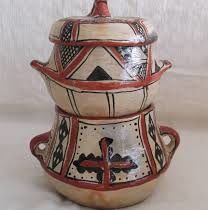Sejnane is renowned as an artisanal center, famous for its pottery exclusively crafted by women, using ancient techniques passed down from generation to generation.
The process of creating pottery by Sejnane’s craftswomen unfolds through several meticulous steps:
- Clay Extraction: The craftswomen extract the clay themselves, clean it of impurities, and knead it with recycled pottery debris before shaping it by hand.
- Polishing and Drying: The pottery is then polished with shells and left to air-dry.
- Natural Coloring: To achieve the desired color, potters use a white or red ocher slip, composed of natural pigments from the local earth.
- Traditional Firing: The pottery is fired directly on the ground, on dried branches, using cow dung as fuel.
- Artistic Decoration: Craftswomen then hand-decorate their creations with motifs such as lines, dots, crosses, and triangles, tinted with brown and red ocher.
The black color on the pottery is achieved in two different ways depending on the desired result:
- For a darkened surface effect, the baked objects are covered with still-burning wood debris.
- For delicate patterns, craftswomen use mastic powder, a Mediterranean shrub.
In Sejnane, around 500 craftswomen contribute to this tradition, working in enterprises of various sizes, from individual micro-enterprises to larger ones employing over 50 people, and in some cases, more than 100.
The Tunisian tableware pottery from Sejnane stands out for its unique features:
- Their soft texture and carefully calibrated firing make them semi-ceramic, providing optimal culinary quality for cooking boiled foods.
- The entirely manual production gives a human touch to each artisanal object, using raw materials directly sourced from nature, legitimately earning them the label of ecological pottery.
- The hand-molding technique, with the assembly of short strips of clay, evokes weaving or basketry.
- Impeccable finishes, with the application of colored slip and polishing, add a distinct shine to the crafted objects.
- As a biological product, these potteries offer exceptional culinary quality.
- Ceramic comes in various forms, whether molded or turned, glazed or enamelled, hollow or flat (tiles), and can be both functional and artistic.
- The natural color comes from a white or red ocher slip, using white clay as a natural pigment from the local earth.
- Finally, these Tunisian potteries are genuinely unique, being the only ones that are completely organic, offering excellent culinary quality, and showcasing a distinctive design.


